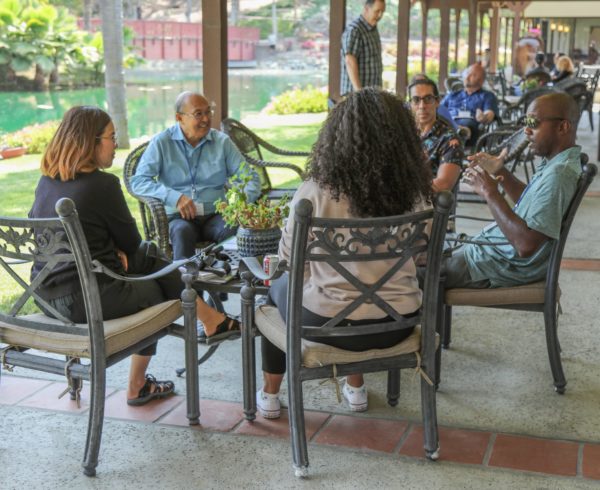For those who have a difficult time reconciling how a good God could allow a world where suffering exists, I wrote this blog for you. I tried to avoid trite and unhelpful comments. Instead, I attempted to present this topic in ways that are constructive and lead to hopeful thinking. Of course, my word is not the final word on the matter, but maybe it will trigger some meaningful and constructive conversations about the problems associated with suffering.
Let’s cut to the chase
When it comes to suffering, people want to know why God would allow us to suffer.
“If God is a good,” it is asked, “then why would this world have any suffering at all?”
Christians and other theists have also wrestled with this question for centuries and have suggested many different interpretations to help themselves and others cope with the existence of suffering in our world.
For some, however, these interpretations simply don’t satisfy. The question of suffering leads them to stop believing in God altogether (or to never start). They can’t comprehend why a “good God” would allow suffering to exist in this world.
Making it personal
In one way or another, we have all struggled with the reality of suffering in our world.
Last year, I lost my dad.
Within six months, Naomi lost her mom.
While this did not pose a threat for me in continuing to believe in God, it was definitely a trying time for my faith. In fact, there were moments and hours when I was angry with God because of the way my father had died in addition to the fact that my wife did not have the opportunity to meet him in person.
So I can empathize with asking God, “Why?”
Looking for answers
It never seems to help when people who believe in God give trite explanations for suffering to those who struggle with it. Nor does it help when they belittle those who are unable to maintain belief because of the horrors of suffering in our world.
It is doubly unhelpful when people of faith act as if those who struggle haven’t put some deep thought (perhaps even tears) into the matter. The truth is that for many people, even people of faith, who struggle with the existence of suffering in our world, there is usually a lot more going on in their internal process.
Sometimes, because of the personal suffering they’ve experienced or they know someone (a loved one, friend, coworker) who has experienced suffering, it has deeply traumatized them (psychologically, emotionally and socially).
That being said, while trite answers and misjudging people is entirely unhelpful, trying to find some resolution to “the problem of suffering” is a worthy thing to do (intellectually, emotionally, relationally, spiritually). Seeking understanding about any matter of life is deeply part of being human.
So with that in mind, let’s consider the following question.
Is suffering evil or unjust?
The logic goes something like this: “No one should have to suffer. If God exists and is good, God would not have created a world with suffering. Since there is a world with suffering, either God is not good or God does not exist.”
Others of course still maintain that God is good, but they struggle truly believing it.
Are suffering and God mutually exclusive?
In any conversation about the problem of suffering, if we begin with the assumption that all suffering is evil and unjust, then, yes, God will always look bad for allowing this world to continue with it.
But what if we don’t start with that assumption?
Let’s consider for a moment a world where people don’t suffer, ever.
No discomfort. No pressure. No pain. No sickness and disease. No racism. No sexism. No phobias of others. No economic injustices. No violence. No hate.
Just loving actions by everyone everywhere.
Sounds good, I agree. I hope someday for a world like that.
But it is not the world we have right now.
What if the problem with suffering is not suffering itself, but with how we think about suffering?
Where does suffering come from anyway?
Lots of people have suggested different answers, all worthy of consideration.
Some say sin.
Some say the devil.
Some say it’s the natural consequence of life’s ongoing evolution.
Some avoid suffering at all cost.
Some embrace it at all cost.
Some don’t like it but accept it as an inevitable part of being human.
The truth is most of us know what it means to suffer. We have experienced it in many different ways.
But how is it that human beings experience suffering to begin with? Where does suffering come?
Let’s start with something that seems obvious.
In any attempt to describe suffering, most of us will likely describe something that has caused us pain. If we describe suffering as something that has caused us pain, then this at least opens us up to a more meaningful and fuller conversation.
Because all of us have experienced something that has caused us pain.
A world of pain
The fact that we human beings experience pain and believe we experience pain means that most of us assume two states of affairs are at work in our world simultaneously. One, that within our world exists a normal or healthy state of affairs. Within this state of affairs, things are in-joint so to speak.
Two, that within our world, there also exists an abnormal or unhealthy state of affairs where things are out-of-joint.
To say it differently, things are both happening as they should be and not happening as they should be at the same time.
Let me say what I hope is obvious to most of us: some of the causes or triggers of the pain and suffering we experience in our lives are hard to detect. Or we don’t know where they originate from. Diseases are an example of this.
So while it’s true we can’t detect where all causes of suffering in our world come from, there are some causes of pain and suffering we do know.
Starting with what we know, rather than what we don’t know, can prove to be helpful.
Let me submit two causes of pain and suffering for consideration that many of us can acknowledge.
First cause: some pain and suffering we experience come from other peoples’ choices or actions that harm us (whether they intended to harm us or not).
Second cause: some pain and suffering we experience is self-inflicted by our own choices or actions (even if the self-infliction was unintended for the purpose of harming ourselves and/or was learned from someone else like a parent, friend or spouse).
These two causes (or triggers) of suffering and pain are so common and routine, it’s not a stretch to suggest that they may be two of the leading causes of pain and suffering we experience in our world.
Of course, many of us may want to bring up other triggers or causes for suffering and pain like ongoing medical conditions. And, I in no way want to minimize those. I can personally attest to dealing with chronic pain in various parts of my body over the years, have had multiple surgeries, and like many of you routinely experience even minor aches and pains.
While medical conditions are a reality for many of us, I want to focus on the two causes I already mentioned since they are things we all experience on an almost daily basis. And they can help to bring home the larger points I’m getting at.
First big “aha” moment
We live in the kind of world where human beings can affect other people, either positively or negatively (and usually a combination of both). We can also affect ourselves individually by the way we treat ourselves.
What about good pain?
And we haven’t even talked about how the pain we sometimes feel may have come from something good happening to us, in us or through us.
For example, someone loves us and we feel pain. We love someone and we feel pain.
Call it “good pain” if you like. Actually, medically speaking all “pain” is good in that pain leads the body (and the person who owns it) to address an issue or a set of issues that need to be dealt with.
While “good pain” is important to talk about, it’s interesting that we usually engage in this conversation more when pain is understood through a negative lens.
Second big “aha” moment
The second “Aha” moment for me was taking the first “Aha” moment and placing it in a world where there is a creator God.
Here is is:
If God exists, God created the kind of world where human beings can and will affect one another for better or worse.
The kind of world we do have
If a large degree of the pain and suffering we experience comes from the harm inflicted on us by others and self-inflicted harm then any fault of God’s is this: that God is the one who created the kind of world where people can affect others for better or worse.
We can affect others deeply, meaningfully, emotionally.
But when push comes to shove, isn’t that a good thing?
Isn’t it good that we can affect one another?
To have a world where we can feel something. To affect and be affected.
Most of us in our best moments would not have it any other way. We absolutely want our lives to affect and be affected by others. Relationships and friendship, love and affection, are all consequences of living in the kind of world where our lives can be affected by one another.
And of course, we can affect each other for the worse also: pride, selfishness, hate, destruction are all part of the two sided affect of God creating a world where people can affect and be affected.
In our world, people can make very real choices and do very real things that affect their own lives and the lives of others.
Although God’s choice in creating a world like this comes with both “good” and “bad” pain, I would much rather live in the kind of the world where I can affect and be affected by others.
Wouldn’t you?
Yes, there are times I would rather be a hermit and not have to deal with people at all. Perhaps you’ve felt the same way at times.
But to experience meaningful connection with others is by far worth the risk of experiencing the “bad” pain too.
Wrapping it up
Suffering and pain and out-of-jointedness are something many of us avoid like the plague (or a worldwide pandemic). But when we consider the kind of world we do live in–the one God did create–you may find yourself inspired with appreciation for why and how God created the kind of world we have.
Or at the very least, it may help you to see this topic with fresh eyes.
I hope these considerations have proved valuable to you, and that perhaps you may have even discovered that suffering and pain do not have to be a problem in the usual sense, but instead an opportunity to appreciate and continue becoming the best version of yourself–for yourself and for others.
Take care, Peter






